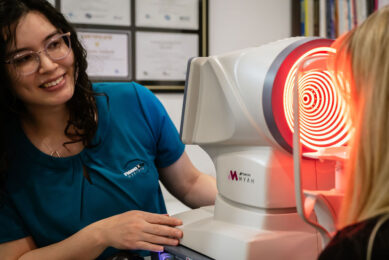
Glaucoma is a group of eye diseases that cause damage to the optic nerve, leading to vision loss and potentially blindness if untreated. The damage is often related to increased intraocular pressure (IOP) within the eye, although glaucoma can also occur with normal eye pressure. Glaucoma often has no early symptoms.
At Vision One Eyecare, all comprehensive eye examinations include glaucoma screening (IOP check, fundus lens examination, and OCT). If we find reason to suspect glaucoma, we will perform secondary glaucoma diagnostic testing (e.g. perimetry, gonioscopy).
Risk Factors
- Age over 60
- Family history of glaucoma
- Certain medical conditions (e.g., diabetes, high blood pressure)
- Use of corticosteroid medications
- Eye injuries or surgeries
- High spectacle prescription
Diagnosis
Glaucoma is diagnosed through comprehensive eye exams, including measuring IOP, inspecting the drainage angle, and assessing optic nerve damage. Early detection is crucial as vision loss from glaucoma is irreversible.
We have all the essential diagnostic equipment for glaucoma:
- Tonometer: Measures intraocular pressure (IOP). We prefer to use applanation tonometry, which is more accurate than the puff test tonometry.
- Fundus lens examination: This is done using a table-top slit lamp to assess nerve damage.
- Medmont Perimeter: Used for perimetry or visual field testing, this equipment maps the field of vision to detect peripheral vision loss, a common early sign of glaucoma.
- Gonioscope: Used for gonioscopy, this device examines the drainage angle of the eye to determine if it is open or closed, which helps in diagnosing the type of glaucoma.
- Optical Coherence Tomography (OCT): This imaging test measures the retinal nerve fibre layer (RNFL) around the optic nerve, which is crucial for detecting early to moderate glaucoma damage. This also takes pachymetry, to assess the corneal thickness.
Regular eye exams are essential for early detection and management of glaucoma to prevent significant vision loss.
OCT Imaging
Optical Coherence Tomography or OCT as it’s more commonly known, is a sophisticated scanning system that produces highly detailed images of the internal structure...
Find Out More
Family Optometry
Family Optometry Services Vision One Eyecare is your local centre for family eyecare in Langwarrin and the surrounding suburbs of Karingal, Frankston, Seaford, Cranbourne, and Mornington...
Find Out MoreVision Screenings
If your child avoids reading, experiences discomfort and fatigue when attempting to complete schoolwork......
Find Out More
Cataracts
A cataract is a clouding of the lens in the eye. The lens is normally clear, but it can become cloudy as we age. This cloudiness can make it difficult to see.
Find Out More
Keratoconus
Keratoconus is a condition that causes the cornea, the clear front part of the eye, to become thin and cone-shaped. This can lead to blurry, distorted vision.
Find Out More
Age-related Macular degeneration (AMD)
Age-Related Macular Degeneration (AMD) is a condition that affects the macula, a small part of the retina that is responsible for central vision. AMD causes blurred, distorted vision, or even blind spots in the centre of your vision.
Find Out More
Contact Lens Care
Contact lenses are a great way to improve your vision, but they require proper care to avoid eye infections and other problems. Here are some tips on how to care for your contact lenses:
Find Out Morevisiononeeyecare
We are your independent and family focused Optometrist.





















